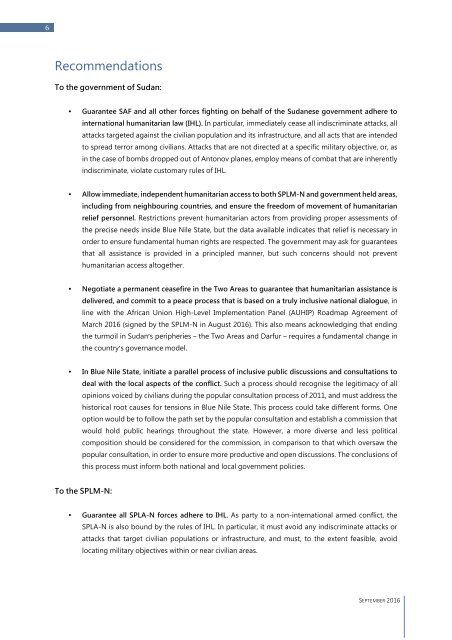A Crisis Normalised
2ctogG9
2ctogG9
Create successful ePaper yourself
Turn your PDF publications into a flip-book with our unique Google optimized e-Paper software.
6 <br />
<br />
Recommendations<br />
To the government of Sudan:<br />
• Guarantee SAF and all other forces fighting on behalf of the Sudanese government adhere to<br />
international humanitarian law (IHL). In particular, immediately cease all indiscriminate attacks, all<br />
attacks targeted against the civilian population and its infrastructure, and all acts that are intended<br />
to spread terror among civilians. Attacks that are not directed at a specific military objective, or, as<br />
in the case of bombs dropped out of Antonov planes, employ means of combat that are inherently<br />
indiscriminate, violate customary rules of IHL.<br />
• Allow immediate, independent humanitarian access to both SPLM-N and government held areas,<br />
including from neighbouring countries, and ensure the freedom of movement of humanitarian<br />
relief personnel. Restrictions prevent humanitarian actors from providing proper assessments of<br />
the precise needs inside Blue Nile State, but the data available indicates that relief is necessary in<br />
order to ensure fundamental human rights are respected. The government may ask for guarantees<br />
that all assistance is provided in a principled manner, but such concerns should not prevent<br />
humanitarian access altogether.<br />
• Negotiate a permanent ceasefire in the Two Areas to guarantee that humanitarian assistance is<br />
delivered, and commit to a peace process that is based on a truly inclusive national dialogue, in<br />
line with the African Union High-Level Implementation Panel (AUHIP) Roadmap Agreement of<br />
March 2016 (signed by the SPLM-N in August 2016). This also means acknowledging that ending<br />
the turmoil in Sudan’s peripheries – the Two Areas and Darfur – requires a fundamental change in<br />
the country’s governance model.<br />
• In Blue Nile State, initiate a parallel process of inclusive public discussions and consultations to<br />
deal with the local aspects of the conflict. Such a process should recognise the legitimacy of all<br />
opinions voiced by civilians during the popular consultation process of 2011, and must address the<br />
historical root causes for tensions in Blue Nile State. This process could take different forms. One<br />
option would be to follow the path set by the popular consultation and establish a commission that<br />
would hold public hearings throughout the state. However, a more diverse and less political<br />
composition should be considered for the commission, in comparison to that which oversaw the<br />
popular consultation, in order to ensure more productive and open discussions. The conclusions of<br />
this process must inform both national and local government policies.<br />
To the SPLM-N:<br />
• Guarantee all SPLA-N forces adhere to IHL. As party to a non-international armed conflict, the<br />
SPLA-N is also bound by the rules of IHL. In particular, it must avoid any indiscriminate attacks or<br />
attacks that target civilian populations or infrastructure, and must, to the extent feasible, avoid<br />
locating military objectives within or near civilian areas.<br />
SEPTEMBER 2016


